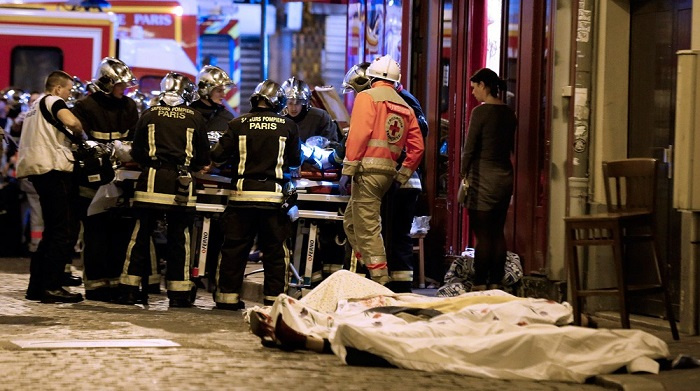Europe and ISIS after Terrorist Attacks in France

The study of the trend of the formation and emergence of ISIS, which is the offspring of al-Qaeda, is significant in the analysis of this dangerous phenomenon which has targeted the security of the international community.
When Abubakr al-Baghdadi became the leader of this group, their terrorist activities expanded and, in fact, the first Takfiri-Jihadi group in Iraq was established. Later, this group used the crisis in Syria, with the slogan of helping the Sunnis enter Syria and occupy some regions of this country. It started to cooperate with other Takfiri groups including the al-Nusra Front and Jeish ul-Islam and with the support of countries in the West, and the region entered the war with the government and people of Syria. After gaining victories in Syria, once again this group expanded its activities in Iraq.
This radical terrorist group has taken advantage of the virtual world to deceive the uninformed western youth and attract thousands of them who suffer from the injustice and rooted discriminations which exist in their countries. On the other hand, the strategic mistake of some countries of the region and the West in using terrorism to advance their own political objectives prepared the ground for the strengthening of this ominous phenomenon to the extent that the international coalition led by the US could not launch a serious and effective fight against ISIS. Under such conditions, the brutal and inhumane actions of this group against hostages and the people of Syria and Iraq and particularly ethnic and religious minorities further revealed the inefficiency of the international anti-ISIS coalition.
On the other hand, this group simultaneously encourages its supporters to kill the citizens of the countries of the coalition. Following the attack against the Charlie Hebdo weekly in Paris and also against a Jewish museum in Belgium, security concerns in Europe and particularly in France were intensified, especially when the European youths who were recruited by ISIS returned to their countries to launch terrorist operations with war experiences and weapons which these countries had sent to equip the Syrian opposition and now were in the hands of ISIS.
Furthermore, by intensifying the crisis in the region including Syria and worsening security and living conditions, European countries were faced with the flux of refugees particularly the Syrians and this issue created a new problem for Europe. Meanwhile, the security concerns caused by the entrance of members of ISIS and Takfiri groups among the refugees to Europe further occupied the minds of the governments and intelligence services of European countries. This concern caused officials of Schengen countries to review their visa policies and establish border controls and limitations which, naturally, brought about some criticisms. But the expansion of the November 13 attacks in Paris, while surprising the government and security institutions in France, led to a heavy shock on the public opinion.
In order to control the situation, the government of France declared a state of emergency for three months. Since, based on media reports, some of these attackers had Belgian citizenship and these attacks were apparently planned in this country and there was the possibility of similar attacks in Brussels, Belgium also declared a state of emergency for several days. Since traces of the attackers were also found in Geneva, this city was in a state of emergency as well. Some European soccer matches were also cancelled due to the possibility of similar attacks in Germany and other European countries.
All these incidents caused all European countries to, despite their differences in some positions and interests, feel threatened by ISIS and attempt to show their determination within the framework of the European Union. In other words, the convergence of European countries to fight terrorism and radicalism is now unavoidable particularly now that the Schengen treaty should be reviewed.
But this significant point should not be ignored that the issue of terrorism and radicalism in Europe which is apparently intensified by the crisis in Syria and the Middle East and the role of regional allies of Europe has become very clear, is rooted in the social problems, a part of which is related to Europe itself and its wrong policies; their domestic policies and discriminative approaches regarding the minorities and immigrants and also their unwise policies in the Middle East especially Syria and even their selective approaches against terrorism and their division to moderate and radical, whose consequences threaten the European Union now.
Nonetheless, the fight against terrorism needs firm determination of the international community and convergence of the power of all countries which are now threatened by this phenomenon. Strong decisions are needed to find proper solutions for this problem.

